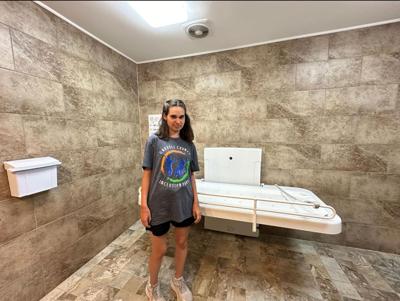The Tennessee Council on Developmental Disabilities celebrated its 50th anniversary this year — in that time span, the agency saw lots of changes for the community it serves. In 1975, many people with disabilities lived in institutions away from their families; children with disabilities often couldn’t attend their neighborhood school; finding a job or living independently was often not within reach for disabled people.
One way the independent state entity makes change is through its Partners in Policymaking program, a free program that trains people with disabilities and their families to be advocates. Chrissy Hood, a graduate of the program, spent years advocating for access to adult-size changing tables. After several years of diligent work, Tennessee became the first state to offer adult changing tables in all of its state parks. It’s Hood’s lived experience, plus the confidence and training infused by the council, that enabled this change and others like it.
While Tennessee is often behind compared to other states on matters of health care, the council’s work allows the state to be ahead in some disability matters. Tennessee was ahead of the curve in closing outdated residential institutions for people with disabilities and later, offering tech-centric programming. And when the state is behind, members of the council get involved: In the passage of the Katie Beckett Program, which helps pay for care for children with disabilities regardless of income, graduates of Partners in Policymaking participated in a 72-day sit-in to get it passed.
The Coalition on Developmental Disabilities is the place to go for information, like the Disability Pathfinder directory (in partnership with the Vanderbilt Kennedy Center). I even subscribe to their free print product, Breaking Ground magazine. The work all falls under a simple guiding principle: self-determination, the ability to make your own choices about your future.
The council’s work also serves to remind me that advancements like the 1990 Americans with Disabilities Act were painfully recent, and we have a long way to go to make sure people with disabilities are thoroughly included in the community. I keep going back to the Council on Developmental Disabilities in my work as a reporter, because the group teaches me about the difficulties people with disabilities face, while also offering lots of examples of how they thrive.
—Hannah Herner
Reporter, Nashville Scene
Our notes of gratitude to the community advocates, health care workers and others who make Nashville special






